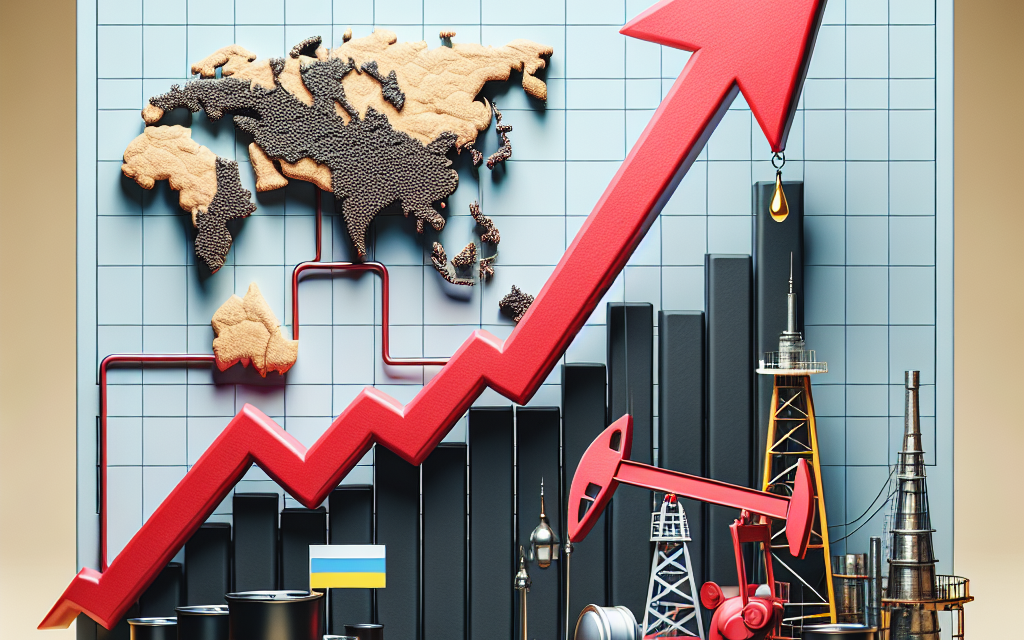“Global Markets on Edge: Oil Prices Surge as Russia-Ukraine Tensions Mount”
Introduction
Oil prices have surged as geopolitical tensions between Russia and Ukraine intensify, raising concerns over potential disruptions in energy supplies. The escalating conflict has heightened fears of supply chain interruptions, given Russia’s significant role as a major global oil producer. Markets are reacting to the uncertainty, with investors closely monitoring the situation for any signs of further escalation that could impact oil exports. This rise in oil prices underscores the vulnerability of global energy markets to geopolitical instability, highlighting the interconnectedness of international relations and economic stability.
Impact Of Russia-Ukraine Tensions On Global Oil Markets
The ongoing tensions between Russia and Ukraine have once again captured global attention, significantly impacting various sectors, particularly the global oil markets. As geopolitical uncertainties intensify, oil prices have experienced a notable surge, reflecting the market’s sensitivity to potential disruptions in supply. This development underscores the intricate relationship between geopolitical events and energy markets, highlighting the vulnerability of global oil supply chains to regional conflicts.
To understand the current situation, it is essential to consider Russia’s pivotal role in the global energy landscape. As one of the world’s largest oil producers, Russia’s influence on global oil prices is substantial. The country’s vast reserves and production capacity make it a key player in the energy market, and any instability in its operations can have far-reaching consequences. The tensions with Ukraine, therefore, pose a significant threat to the stability of oil supplies, as any escalation could lead to disruptions in the flow of oil from Russia to the rest of the world.
Moreover, the strategic location of Ukraine adds another layer of complexity to the situation. Ukraine serves as a critical transit route for Russian oil and gas exports to Europe. Consequently, any conflict in the region could jeopardize the transportation of these vital resources, leading to supply shortages and further price hikes. The European Union, heavily reliant on Russian energy imports, finds itself in a precarious position, as it must navigate the delicate balance between political support for Ukraine and the economic implications of potential energy disruptions.
In addition to the immediate concerns over supply disruptions, the escalating tensions have also fueled market speculation, contributing to the volatility of oil prices. Traders and investors, wary of the potential for conflict, have reacted by driving up prices in anticipation of future shortages. This speculative behavior, while not uncommon in times of geopolitical uncertainty, exacerbates the situation by creating an environment of heightened volatility and unpredictability in the oil markets.
Furthermore, the impact of rising oil prices extends beyond the energy sector, affecting global economies at large. Higher oil prices translate into increased costs for transportation and manufacturing, which can lead to inflationary pressures across various industries. For countries already grappling with economic challenges, the additional burden of rising energy costs can strain financial resources and hinder economic recovery efforts. This ripple effect underscores the interconnectedness of global markets and the far-reaching consequences of regional conflicts.
In response to these developments, governments and international organizations are closely monitoring the situation, exploring diplomatic avenues to de-escalate tensions and ensure the stability of energy supplies. Efforts to diversify energy sources and reduce dependency on Russian oil are also gaining momentum, as countries seek to mitigate the risks associated with geopolitical uncertainties. However, such measures require time and investment, and in the short term, the global oil markets remain at the mercy of the unfolding events in Eastern Europe.
In conclusion, the escalating tensions between Russia and Ukraine have underscored the fragility of global oil markets, highlighting the profound impact of geopolitical events on energy prices and supply chains. As the situation continues to evolve, stakeholders across the globe must remain vigilant, balancing immediate responses with long-term strategies to ensure energy security and economic stability. The current scenario serves as a stark reminder of the intricate interplay between politics and economics, emphasizing the need for comprehensive approaches to address the challenges posed by regional conflicts in an increasingly interconnected world.
How Geopolitical Conflicts Influence Oil Prices
The intricate relationship between geopolitical conflicts and oil prices is a subject of perennial interest and concern for economists, policymakers, and consumers alike. The recent escalation of tensions between Russia and Ukraine has once again brought this issue to the forefront, as oil prices have experienced a noticeable uptick. Understanding the dynamics at play requires an examination of how geopolitical instability can disrupt oil supply chains, influence market perceptions, and ultimately affect global oil prices.
To begin with, geopolitical conflicts often lead to disruptions in oil supply, which can cause prices to rise. In the case of Russia and Ukraine, the region is a significant corridor for oil and natural gas pipelines that supply Europe. Any threat to the stability of these supply routes can create apprehension in the market, leading to speculative trading and increased prices. For instance, if a conflict were to damage infrastructure or lead to sanctions that restrict oil exports, the resulting supply shortfall would likely drive prices upward. This is because oil markets are highly sensitive to changes in supply and demand dynamics, and even the perception of a potential disruption can have immediate effects.
Moreover, geopolitical tensions can also influence oil prices through their impact on market sentiment. Investors and traders often react to news of conflicts by adjusting their portfolios to hedge against potential risks. This behavior can lead to increased volatility in oil markets, as traders buy or sell futures contracts based on their expectations of how the conflict will unfold. In the case of the Russia-Ukraine situation, the uncertainty surrounding the conflict’s resolution has led to heightened market anxiety, contributing to the upward pressure on oil prices. This is compounded by the fact that Russia is one of the world’s largest oil producers, and any instability in its production capabilities can have far-reaching implications for global supply.
In addition to supply disruptions and market sentiment, geopolitical conflicts can also affect oil prices through their impact on currency exchange rates. Oil is typically traded in U.S. dollars, and any fluctuations in the value of the dollar can influence oil prices. For example, if a conflict leads to a depreciation of the dollar, oil prices may rise as it becomes more expensive for countries using other currencies to purchase oil. Conversely, if the dollar strengthens, oil prices may decrease. In the context of the Russia-Ukraine tensions, any economic sanctions imposed on Russia could affect the ruble’s value, which in turn could have ripple effects on oil pricing.
Furthermore, the interconnectedness of global economies means that geopolitical conflicts can have indirect effects on oil prices through their impact on economic growth. For instance, if a conflict leads to a slowdown in economic activity in major oil-consuming regions, demand for oil may decrease, potentially offsetting some of the upward pressure on prices. However, if the conflict escalates and leads to broader economic instability, the resulting uncertainty could further exacerbate price volatility.
In conclusion, the rise in oil prices amid escalating Russia-Ukraine tensions underscores the complex interplay between geopolitical conflicts and global oil markets. Supply disruptions, market sentiment, currency fluctuations, and economic growth all contribute to the intricate web of factors that influence oil prices. As such, understanding these dynamics is crucial for stakeholders seeking to navigate the challenges posed by geopolitical instability in the energy sector.
The Role Of Sanctions In The Oil Price Surge
The recent escalation in tensions between Russia and Ukraine has led to a significant surge in global oil prices, a development that underscores the intricate relationship between geopolitical events and energy markets. Central to this price increase is the role of international sanctions, which have been imposed by Western nations in response to Russia’s actions. These sanctions, aimed at curbing Russia’s economic capabilities, have inadvertently contributed to the volatility in oil markets, highlighting the complex interplay between political decisions and economic outcomes.
To understand the impact of sanctions on oil prices, it is essential to consider the strategic importance of Russia in the global energy landscape. As one of the world’s largest producers and exporters of oil and natural gas, Russia plays a pivotal role in meeting global energy demands. Consequently, any disruption in Russian oil supplies can have far-reaching implications for global markets. The sanctions imposed by Western countries have targeted various sectors of the Russian economy, including its energy industry. These measures have restricted Russia’s ability to access international financing and technology, thereby hindering its capacity to maintain and expand oil production.
Moreover, the sanctions have created an environment of uncertainty, which has further exacerbated the volatility in oil prices. Investors and market participants, wary of potential supply disruptions, have reacted by driving up prices. This reaction is not merely speculative; it reflects genuine concerns about the stability of global oil supplies. The fear of a prolonged conflict and the possibility of more stringent sanctions have added to the anxiety, prompting a surge in oil prices as markets brace for potential shortages.
In addition to the direct impact of sanctions on Russian oil production, there are also indirect effects that contribute to the rising prices. For instance, the sanctions have led to a realignment of global energy trade flows. Countries that previously relied on Russian oil are now seeking alternative sources, increasing demand for oil from other producers. This shift in demand has put upward pressure on prices, as the global market adjusts to the new dynamics. Furthermore, the sanctions have prompted Russia to seek new markets for its oil, often at discounted prices, which has introduced additional complexities into the global pricing structure.
While the immediate impact of sanctions is evident in the rising oil prices, the long-term implications are more nuanced. On one hand, sustained high prices could incentivize increased production from other oil-producing nations, potentially stabilizing the market over time. On the other hand, prolonged geopolitical tensions and continued sanctions could lead to structural changes in the global energy landscape, with lasting effects on supply chains and pricing mechanisms.
In conclusion, the role of sanctions in the recent surge in oil prices cannot be overstated. As geopolitical tensions between Russia and Ukraine continue to unfold, the impact of these measures on global energy markets remains a critical area of concern. The situation serves as a stark reminder of the interconnectedness of political decisions and economic realities, illustrating how actions taken in one part of the world can reverberate across global markets. As the international community navigates this complex landscape, the challenge will be to balance geopolitical objectives with the need for stable and sustainable energy supplies.
Energy Security Concerns Amid Rising Oil Prices

The recent escalation in tensions between Russia and Ukraine has once again brought energy security to the forefront of global concerns, as oil prices experience a significant surge. This development underscores the intricate relationship between geopolitical stability and energy markets, highlighting the vulnerability of global energy supplies to regional conflicts. As the situation unfolds, it is crucial to examine the factors contributing to the rise in oil prices and the broader implications for energy security.
To begin with, the geopolitical tensions between Russia and Ukraine have a direct impact on oil prices due to Russia’s significant role in the global energy market. As one of the world’s largest oil producers, Russia’s actions and policies can influence global supply dynamics. The current conflict has raised fears of potential disruptions in oil supplies, prompting market participants to react with caution. Consequently, the uncertainty surrounding the situation has led to increased volatility in oil prices, as traders and investors weigh the potential risks to supply chains.
Moreover, the strategic importance of Ukraine as a transit country for Russian oil and gas exports to Europe cannot be overstated. Any disruption in this transit route could have far-reaching consequences for European energy security. The European Union, heavily reliant on Russian energy imports, faces the challenge of ensuring a stable and diversified energy supply. This situation has reignited discussions on the need for Europe to reduce its dependency on Russian energy and explore alternative sources and routes. In this context, the current crisis serves as a stark reminder of the importance of energy diversification and the development of resilient energy infrastructure.
In addition to the immediate impact on oil prices, the ongoing tensions have broader implications for global energy security. The potential for prolonged conflict raises concerns about the stability of energy markets and the ability of countries to meet their energy needs. As nations grapple with these challenges, there is a growing recognition of the need to enhance energy resilience through strategic planning and international cooperation. This includes investing in renewable energy sources, improving energy efficiency, and strengthening energy infrastructure to withstand potential disruptions.
Furthermore, the rise in oil prices has economic implications that extend beyond the energy sector. Higher oil prices can lead to increased costs for transportation and manufacturing, ultimately affecting consumer prices and inflation rates. This, in turn, can have a ripple effect on global economic growth, as countries adjust to the changing economic landscape. Policymakers must navigate these complexities, balancing the need for energy security with the economic realities of rising oil prices.
In conclusion, the escalating tensions between Russia and Ukraine have underscored the critical importance of energy security in an interconnected world. The surge in oil prices serves as a reminder of the vulnerability of global energy markets to geopolitical events. As countries strive to ensure stable and secure energy supplies, there is a pressing need for coordinated efforts to address the challenges posed by such conflicts. By prioritizing energy diversification, investing in sustainable energy solutions, and fostering international collaboration, nations can enhance their energy resilience and mitigate the impact of future geopolitical disruptions. As the situation continues to evolve, the global community must remain vigilant and proactive in safeguarding energy security for the future.
Economic Implications Of Escalating Oil Costs
The recent escalation in tensions between Russia and Ukraine has led to a significant rise in oil prices, a development that carries profound economic implications on a global scale. As geopolitical uncertainties intensify, the oil market, which is inherently sensitive to such disruptions, has responded with a marked increase in prices. This surge in oil costs is not merely a reflection of immediate supply concerns but also a manifestation of broader economic anxieties that ripple through various sectors.
To begin with, the direct impact of rising oil prices is most acutely felt in the transportation and manufacturing industries. As oil is a critical input for these sectors, any increase in its cost translates to higher operational expenses. Consequently, companies may face the difficult decision of whether to absorb these costs or pass them on to consumers. In many cases, the latter option is chosen, leading to increased prices for goods and services. This, in turn, contributes to inflationary pressures, which central banks around the world are already grappling with in the wake of the COVID-19 pandemic.
Moreover, the rise in oil prices can exacerbate existing economic disparities. For oil-importing countries, particularly those with fragile economies, the increased cost of oil imports can strain national budgets and widen trade deficits. These nations may find themselves compelled to allocate a larger portion of their financial resources to energy procurement, potentially at the expense of other critical areas such as healthcare and education. On the other hand, oil-exporting countries might experience a temporary economic boon from higher revenues. However, this windfall is often accompanied by increased volatility and uncertainty, as these nations remain vulnerable to the whims of the global oil market.
In addition to these direct economic effects, the rise in oil prices can have significant implications for energy policy and the transition to renewable energy sources. As fossil fuel costs climb, there is a renewed impetus for governments and businesses to invest in alternative energy solutions. This shift, while beneficial in the long term for reducing carbon emissions and combating climate change, requires substantial upfront investment and infrastructure development. The current situation may accelerate these efforts, but it also highlights the challenges of balancing immediate economic needs with long-term sustainability goals.
Furthermore, the financial markets are not immune to the repercussions of escalating oil prices. Investors, wary of the potential for prolonged geopolitical instability, may exhibit increased caution, leading to heightened market volatility. This uncertainty can affect investment decisions across various sectors, as businesses reassess their strategies in light of changing cost structures and consumer behavior. Additionally, currency markets may experience fluctuations as countries adjust their monetary policies to address the economic impacts of rising oil prices.
In conclusion, the increase in oil prices amid escalating Russia-Ukraine tensions underscores the intricate interplay between geopolitics and economics. The ramifications extend beyond immediate supply concerns, influencing inflation, trade balances, energy policy, and financial markets. As the situation continues to evolve, it is imperative for policymakers and businesses to navigate these challenges with foresight and adaptability, ensuring that short-term responses do not undermine long-term economic stability and sustainability. The current scenario serves as a stark reminder of the interconnectedness of global economies and the need for collaborative efforts to address the multifaceted challenges posed by rising oil costs.
Strategies For Mitigating The Impact Of Oil Price Volatility
As global markets grapple with the escalating tensions between Russia and Ukraine, the resultant rise in oil prices has become a pressing concern for economies worldwide. This volatility in oil prices underscores the urgent need for effective strategies to mitigate its impact. To navigate this challenging landscape, businesses and governments must adopt a multifaceted approach that combines both short-term and long-term strategies.
In the short term, one of the most effective strategies is to diversify energy sources. By reducing reliance on oil, particularly from geopolitically unstable regions, countries can shield themselves from sudden price spikes. Investing in alternative energy sources such as natural gas, solar, and wind can provide a buffer against oil market fluctuations. Additionally, strategic petroleum reserves can be utilized to stabilize supply and manage price volatility. These reserves act as a cushion, allowing countries to release oil into the market during periods of high prices, thereby alleviating pressure on consumers and businesses.
Moreover, enhancing energy efficiency across various sectors can significantly reduce oil consumption. Implementing energy-saving technologies and practices in industries, transportation, and households can lower overall demand, thus mitigating the impact of rising oil prices. Governments can play a pivotal role by incentivizing energy efficiency through tax breaks, subsidies, and regulatory measures. Such initiatives not only help in managing oil price volatility but also contribute to environmental sustainability.
In the long term, fostering innovation in energy technology is crucial. Research and development in renewable energy technologies and energy storage solutions can lead to breakthroughs that reduce dependency on oil. By investing in cutting-edge technologies, countries can transition towards a more sustainable and resilient energy system. Furthermore, international cooperation and partnerships can facilitate the sharing of knowledge and resources, accelerating the development and deployment of innovative energy solutions.
Another critical aspect of mitigating oil price volatility is the implementation of robust financial strategies. Hedging mechanisms, such as futures contracts and options, can be employed by businesses to lock in prices and protect against adverse price movements. These financial instruments provide a level of certainty and stability, allowing companies to plan and budget more effectively. Additionally, governments can establish stabilization funds that accumulate surplus revenues during periods of high oil prices. These funds can then be used to cushion the economy during downturns, ensuring fiscal stability and continuity of public services.
Furthermore, fostering economic diversification is essential for reducing vulnerability to oil price shocks. Economies heavily reliant on oil exports or imports are particularly susceptible to price fluctuations. By diversifying economic activities and developing other sectors such as manufacturing, agriculture, and services, countries can reduce their dependence on oil and build a more resilient economic foundation. This diversification not only mitigates the impact of oil price volatility but also promotes sustainable economic growth.
In conclusion, the rise in oil prices amid escalating Russia-Ukraine tensions highlights the need for comprehensive strategies to mitigate the impact of oil price volatility. By diversifying energy sources, enhancing energy efficiency, fostering innovation, implementing financial strategies, and promoting economic diversification, countries can better navigate the challenges posed by volatile oil markets. These strategies not only provide immediate relief but also lay the groundwork for a more sustainable and resilient energy future. As the global landscape continues to evolve, proactive measures and international collaboration will be key to ensuring energy security and economic stability.
The Future Of Energy Markets In A Geopolitically Unstable World
The recent escalation in tensions between Russia and Ukraine has once again brought the fragility of global energy markets into sharp focus. As geopolitical uncertainties mount, oil prices have experienced a notable surge, reflecting the market’s sensitivity to potential disruptions in supply. This development underscores the intricate relationship between geopolitical stability and energy market dynamics, highlighting the need for a comprehensive understanding of how such tensions can shape the future of energy markets.
The Russia-Ukraine conflict is not merely a regional issue but a matter of global concern, given Russia’s significant role as a major energy supplier. Europe, in particular, relies heavily on Russian oil and gas, making it vulnerable to any potential supply disruptions. As tensions escalate, fears of sanctions or retaliatory measures that could impact energy exports have contributed to the upward pressure on oil prices. This situation serves as a stark reminder of the interconnectedness of global energy markets and the extent to which geopolitical events can influence them.
In addition to the immediate impact on oil prices, the ongoing conflict has broader implications for the future of energy markets. As countries grapple with the need to secure stable energy supplies, there is likely to be an increased focus on diversifying energy sources and reducing dependency on geopolitically unstable regions. This shift could accelerate the transition towards renewable energy, as nations seek to mitigate the risks associated with reliance on fossil fuels from volatile areas. Consequently, the current geopolitical climate may serve as a catalyst for more robust investments in renewable energy infrastructure and technology.
Moreover, the situation highlights the importance of strategic energy reserves and the role they play in stabilizing markets during times of crisis. Countries with substantial reserves are better positioned to weather supply disruptions, providing a buffer that can help mitigate price volatility. This underscores the need for nations to not only invest in renewable energy but also to maintain adequate reserves of traditional energy sources as a contingency measure.
As the world navigates these challenges, international cooperation and dialogue become increasingly crucial. Collaborative efforts to address energy security concerns can help prevent market disruptions and ensure a more stable energy future. Multilateral organizations and agreements may play a pivotal role in facilitating such cooperation, fostering an environment where energy resources are managed sustainably and equitably.
In conclusion, the rise in oil prices amid escalating Russia-Ukraine tensions serves as a poignant reminder of the vulnerability of global energy markets to geopolitical instability. As nations confront these challenges, there is a growing impetus to diversify energy sources, invest in renewables, and enhance strategic reserves. The path forward will require a delicate balance between addressing immediate energy needs and pursuing long-term sustainability goals. By fostering international cooperation and embracing innovative solutions, the global community can work towards a more resilient and secure energy future, even in the face of geopolitical uncertainties.
Q&A
1. **Question:** What is the primary reason for the recent rise in oil prices?
**Answer:** The primary reason for the recent rise in oil prices is the escalating tensions between Russia and Ukraine.
2. **Question:** How do geopolitical tensions typically affect oil prices?
**Answer:** Geopolitical tensions can lead to fears of supply disruptions, causing oil prices to rise due to anticipated shortages or increased risk.
3. **Question:** Which countries are most affected by the rise in oil prices due to the Russia-Ukraine conflict?
**Answer:** Countries heavily reliant on oil imports, particularly in Europe, are most affected by the rise in oil prices due to the Russia-Ukraine conflict.
4. **Question:** What role does Russia play in the global oil market?
**Answer:** Russia is one of the world’s largest oil producers and exporters, playing a significant role in the global oil market.
5. **Question:** How might the rise in oil prices impact global economies?
**Answer:** The rise in oil prices can lead to increased costs for transportation and goods, contributing to inflation and potentially slowing economic growth.
6. **Question:** What measures can countries take to mitigate the impact of rising oil prices?
**Answer:** Countries can increase energy efficiency, diversify energy sources, release strategic oil reserves, or negotiate alternative supply routes to mitigate the impact of rising oil prices.
7. **Question:** How do oil price fluctuations influence energy policy decisions?
**Answer:** Fluctuations in oil prices can influence energy policy decisions by encouraging investment in alternative energy sources, energy independence initiatives, and strategic reserves management.
Conclusion
The escalation of tensions between Russia and Ukraine has led to a significant rise in oil prices, driven by concerns over potential disruptions in supply from one of the world’s largest oil producers. The geopolitical instability has heightened market volatility, with traders and investors reacting to the possibility of sanctions and supply chain interruptions. This situation underscores the vulnerability of global energy markets to geopolitical events and highlights the critical role of Russia in the global oil supply chain. As the conflict continues to unfold, oil prices are likely to remain volatile, impacting global economic stability and energy security.





